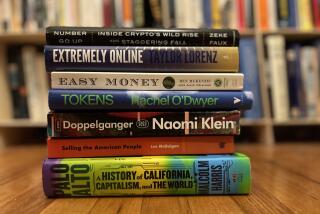A Tribute to the Father of Computing’s Future
- Share via
If you think that William Burroughs--the once alcohol- and opiate-besotted author of the novel “Naked Lunch”--writes revoltingly provocative prose, try to imagine the kinds of hardware and software he might have concocted if he had stayed in the family business.
“Instead of developing artificial intelligence, he’d be developing artificial insanity,” asserts science fiction author and Burroughs devotee Bruce Sterling. “We’d now have color laser printers that could splatter.”
All kidding aside, until his father sold out, young William was the scion of Burroughs Adding Machines Co., which is now known worldwide as Unisys. Technically, there is no reason why he couldn’t have brought his, ah, unique sensibility to the rapid evolution of computers. To Burroughs, who used prose and drugs as tools to explore the nature of sanity, “ideas are the viruses of the mind.” (Through a spokesman, the 77-year-old Burroughs declined to speculate about the road not taken.)
Historically, the computer industry has been dominated as much by patriarchy and personality as by technology. IBM founder Thomas Watson Sr. turned his company over to his son Thomas Jr.--arguably the spiritual antithesis of William Burroughs. IBM, both as a company and as a culture, embodied the Watsons’ sense of rectitude and moral self-righteousness. Similarly, the late An Wang tried to turn over the reins of Wang Laboratories to son Fred.
Moreover, Burroughsian bohemian excess isn’t exactly alien to the computing counter-culture. Apple Computer co-founder Steve Jobs and Lotus 1-2-3 co-creator Mitch Kapor publicly acknowledge that their eclectic experiences in altered consciousness strongly influenced their own approaches to technology design.
While Burroughs himself never crafted a line of software, his work has been a source of inspiration to those who do. Burroughs is the patron saint of the “cyberpunk” science fiction movement that has championed the most exciting domain of software design, virtual reality: using technology to create digital landscapes and worlds for people to inhabit.
“No one really makes the connection that a lot of the virtual reality software that people discuss is quite Burroughsian in nature,” asserts Michael Benedikt, a University of Texas architecture professor and editor of “Cyberspace”--a book about virtual reality design. Benedikt notes that Burroughs’ personal adventures in chemistry and prose have made him, for better or worse, a pivotal figure in this emerging field.
“He was such an influence on me that I’m not really able to objectively evaluate it,” says cyberpunk pioneer William Gibson, the author of “Neuromancer” and other classic novels of the genre. “I’ve always had the feeling that the virtual reality research people read my stuff at the gadget level and took it seriously.”
Bruce Sterling, one of the most articulate spokesmen for the cyberpunk movement, believes that computers--not drugs--are now the medium through which to alter consciousness and craft artificial realities. “In a way,” he says, “staring into a computer screen is like staring into an eclipse. It’s brilliant and you don’t realize the damage until it’s too late.”
What’s happening, says Benedikt, is that virtual reality designers are now treating computers and software with much the same attitude that Burroughs treated drugs and texts: as experimental media that “by virtue of sheer intensity creates a different stream of consciousness and awareness.”
To be sure, the technologies of virtual reality are evolving, and it’s unclear what their ultimate forms might be. But then, many believe that virtual reality is the ultimate destiny of computer design.
If that’s true, it’s possible that the ex-computer scion Burroughs may ultimately have a greater influence over the future of computer software than the son who built his father’s IBM into the most powerful computer company in the world. Somehow, I find that possible reality as perverse and ironic as anything Burroughs has written.
More to Read
Sign up for our Book Club newsletter
Get the latest news, events and more from the Los Angeles Times Book Club, and help us get L.A. reading and talking.
You may occasionally receive promotional content from the Los Angeles Times.










